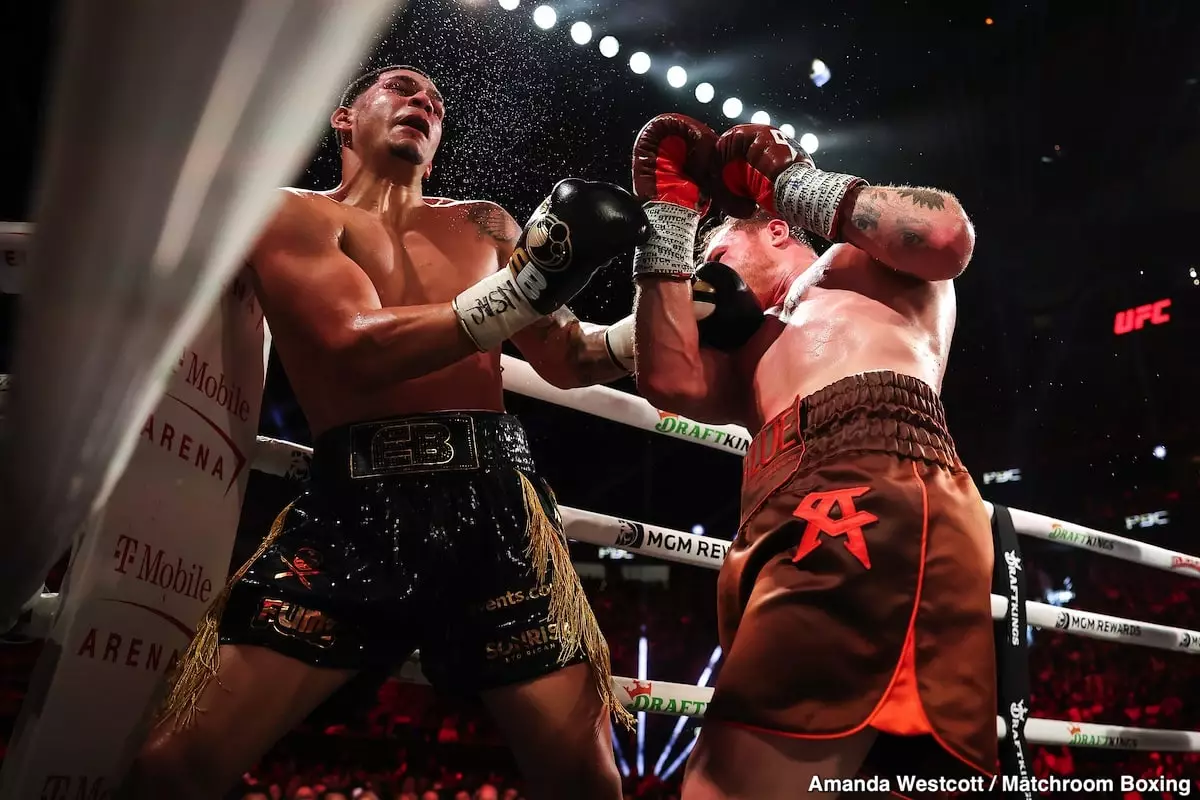In the world of boxing, audacious challenges and declarations are not uncommon, but Edgar Berlanga’s recent social media assertions have stirred a conversation worth delving into. Berlanga, a rising super middleweight star, expressed a desire to “test greatness” by stepping up to heavyweight and taking on Anthony Joshua. This proclamation follows Joshua’s recent struggles in the ring and raises questions about the legitimacy, weight class dynamics, and implications of such a matchmaking.
It’s essential to consider the circumstances under which Berlanga made this announcement. After a decision loss to Canelo Alvarez, Berlanga appears eager to regain media focus and public interest. By proposing a fight with Joshua—a former heavyweight champion—he’s not only aiming for significant notoriety but also hinting at his own ambition to climb the ranks within the boxing community. However, this declaration cannot be seen in a vacuum. Joshua’s recent defeats have dramatically affected his stature, leading many fans and analysts to question whether Berlanga’s remarks stem from true ambition or if they are merely speculative banter designed to generate buzz.
Berlanga mentioned he would enter the ring at 210 pounds, a notable weight for a fighter moving up from the super middleweight division. Though he has shown the capability to handle larger weights—having fought Canelo at around 193 pounds—Jah’s physical attributes and skill set present a real dilemma. A fight between Berlanga and Joshua, given the latter’s significant size and power advantage, raises the stakes dramatically—both for Berlanga’s credibility and Joshua’s legacy.
At 6’1″, Berlanga presents a tall frame for a 168-pound fighter, and his physicality could potentially allow him to adapt to the heavier classes. His recent foray against Alvarez showcased his resilience and ability to stand toe-to-toe with one of the sport’s elite. However, the transition to heavyweight poses unique challenges. Fighters in this division are often equipped with notable knockout power, a critical factor Berlanga would need to contend with, should he ever step into the ring with Joshua.
Conversely, Joshua has exhibited a plethora of attributes including speed, strength, and technical prowess throughout his career. After suffering a devastating loss to Daniel Dubois, a bout with Berlanga could be perceived as a significant risk for Joshua. Such a fight might raise alarming questions about his trajectory in boxing; a loss to a much smaller opponent could be catastrophic for his reputation.
Hence, if one examines the implications of this potential matchup, it appears highly unlikely to materialize. The disparity in experience, physical size, and skill sets paints a challenging picture for Berlanga, regardless of his confidence.
While Berlanga’s ambition should be lauded, it begs the question of whether such comments are strategic or impulsive. Boxing fans often embrace the bravado associated with fighters boldly calling out opponents, yet intent is just as critical. If Berlanga genuinely desires to confront Joshua, the pathway to that goal requires a comprehensive plan, highlighting matches against established contenders in his current weight class.
Furthermore, fans have entered a cycle of skepticism regarding the validity of statements made within the sport. With Berlanga being scrutinized post-Canelo for his fighting strategy and too quick posturing for high-profile fights, it poses the question: Does he risk his career by disillusioning potential promoters and fans? Balancing ambition with successful career management becomes a fine line to tread.
Ultimately, the boxing landscape is unpredictable and laden with opportunities. Though a matchup with Anthony Joshua may not be on the horizon, Berlanga’s determination can lead to substantial advancements in his career. With continued improvement and strategic fights, he could potentially pave his way into higher-ranked bouts within the super middleweight or light-heavyweight divisions.
In reflection, confidence and the instinct for attracting attention are a vital part of a fighter’s persona. Berlanga’s challenge to Joshua, more than anything else, is a manifestation of a youth bravado—a call to arms that might serve as a stepping stone for future engagements. Only time will determine whether this anticipated audacity blossoms into tangible success or remains a fleeting sound bite lost in the echoes of boxing history. As fans, the ongoing drama in the heavyweight and super middleweight scenes certainly keeps us engaged.

